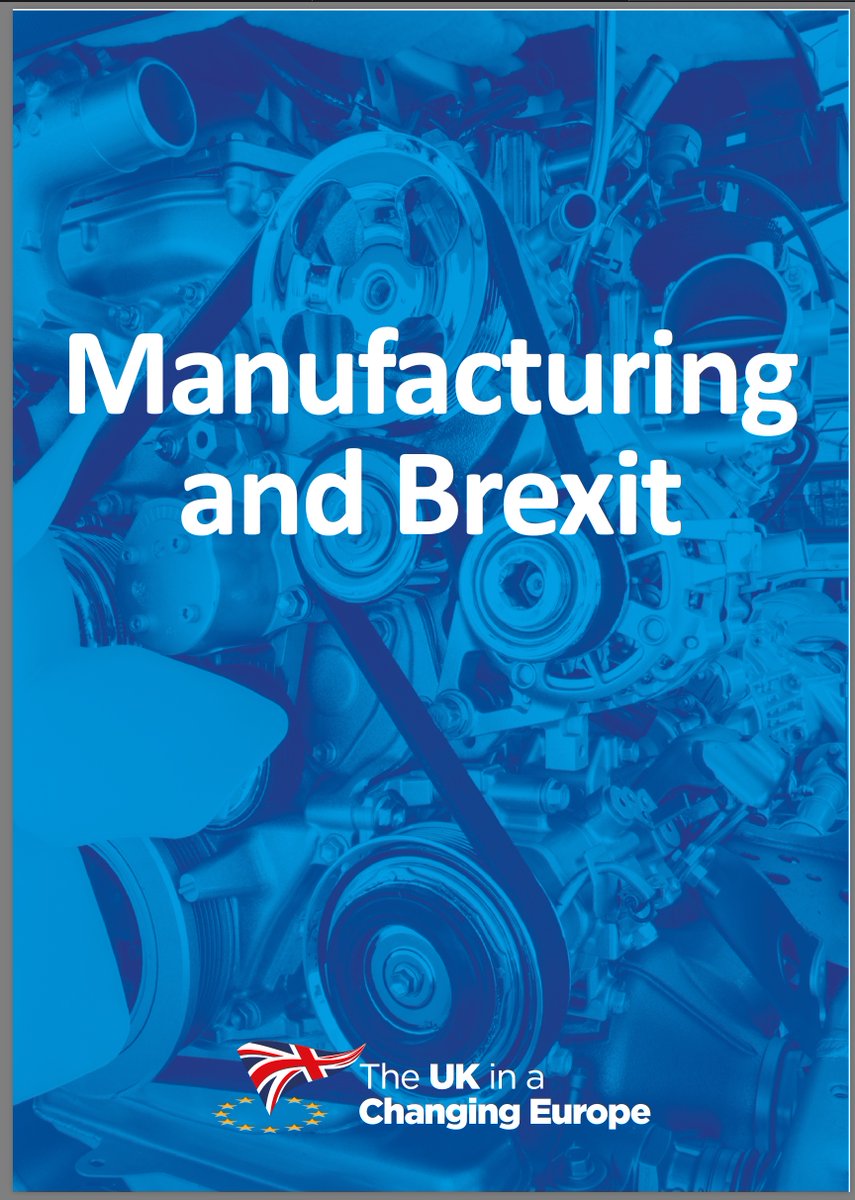Roll up, roll up, for yet another spectacular @UKandEU report. 🥳🥳🥳This time on Brexit and manufacturing. 🚗✈️💊THREAD ukandeu.ac.uk/wp-content/upl… 

First, thanks to all those involved @dgbailey and Ivan Rajic wrote it, @jillongovt edited and improved it, @NLehl managed the whole editorial process and @Aron_Cheung once again produced the striking charts.
#Manufacturing makes up around 10% of the #UK #economy and 9% of private sector employment.
It provides close to half of UK #exports and around 60% of private sector investment.
It provides close to half of UK #exports and around 60% of private sector investment.

Disruption to #manufacturing from #Brexit would have a sizeable negative impact on the wider #UK #economy.
#UK manufacturing is highly integrated with the EU single market – nearly 1/2 of all goods imports and exports come from or go to the EU.
#UK manufacturing is highly integrated with the EU single market – nearly 1/2 of all goods imports and exports come from or go to the EU.

The conseqs will be worst with no deal.
Nearly all #manufacturing sectors worry about a lack of regulatory alignment with the #EU and the bulk want continued free trade.
Some such as automotive could suffer a severe blow from tariffs or if there are no common regulations
Nearly all #manufacturing sectors worry about a lack of regulatory alignment with the #EU and the bulk want continued free trade.
Some such as automotive could suffer a severe blow from tariffs or if there are no common regulations

That said, some sectors will face fewer disruptions.
For example, even with no-trade deal aerospace will likely face no tariffs, as international trade in the sector is mostly tariff-free.
But even in these sectors, firms are worried about regulatory hurdles.
For example, even with no-trade deal aerospace will likely face no tariffs, as international trade in the sector is mostly tariff-free.
But even in these sectors, firms are worried about regulatory hurdles.
In most cases, #Brexit will create additional costs for companies.
This can be due to #tariffs, customs declarations, certification costs, rules of origin compliance, loss of collaboration in R&D, border delays, #EU customers switching suppliers, visa costs for EU workers, etc
This can be due to #tariffs, customs declarations, certification costs, rules of origin compliance, loss of collaboration in R&D, border delays, #EU customers switching suppliers, visa costs for EU workers, etc
Manufacturers are concerned first and foremost about the #UK falling out of common #EU regulations.
Uncertainty about the UK-EU relationship is making it difficult for manufacturers to prepare and this uncertainty has already contributed to falling investment.
Uncertainty about the UK-EU relationship is making it difficult for manufacturers to prepare and this uncertainty has already contributed to falling investment.
Above all, they want to avoid a no-trade deal scenario, especially in the wake of the hit to the economy from Covid-19.
The government could introduce more measures to cushion the post-Brexit shock, such as loans, wage subsides, taking equity stakes in companies, etc
The government could introduce more measures to cushion the post-Brexit shock, such as loans, wage subsides, taking equity stakes in companies, etc
Long-term more power could be transferred to UK’s regions and devolved institutions.
A range of policies on issues such as skills, R&D, financial support for firms and advisory support could be more firmly integrated within an overarching industrial policy.
A range of policies on issues such as skills, R&D, financial support for firms and advisory support could be more firmly integrated within an overarching industrial policy.
This would mean a ‘policy reset’, with a need to invest more into an industrial policy, bringing the UK in line with other advanced economies.
Specific sectors or regions could be targeted, and in particular firms can be helped to take advantage of new technologies.
Specific sectors or regions could be targeted, and in particular firms can be helped to take advantage of new technologies.
Anyway, it's early and I'm hungry. This is a quick summary, but you'd be far better off reading the whole thing for yourself! ukandeu.ac.uk/wp-content/upl…
• • •
Missing some Tweet in this thread? You can try to
force a refresh











